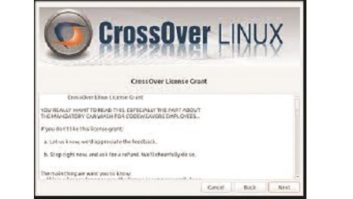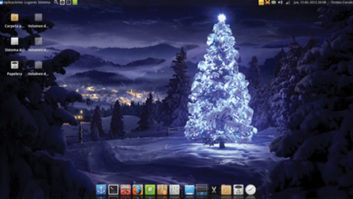In the early 1990s, it seemed that the major PC operating systems had pretty well marked their territories. Creative endeavors went with Macintosh; business and finance adopted Windows; Linux was embraced by the computer geeks.
But are those boundaries cast in stone? Andrew (A.J.) Janitscheck, director of program operations and support for Radio Free Asia, thinks it might be time for radio stations to do a rethink.
His NAB Show presentation “Ubuntu — Radio Ready” describes RFA’s adoption of Linux, which began with system administrators and spread much further. Today, the RFA studios and broadcast network are powered by Ubuntu and Ubuntu Studio.

Ubuntu Studio 9.10 is shown multitasking with JACK Audio Connection Kit: Qt GUI Interface 0.3.4, Ardour 2.8.2, Patchage 0.2.3, Hydrogen 0.9.3, Blender 4.29a.
NEGLECTED
Radio Free Asia began using Linux in its Washington headquarters more than a decade ago. Over the years, flavors Red Hat, Suse and Debian have been used. Despite RFA’s success with Linux, it remains largely neglected by much of the broadcasting community. Janitscheck said there are some barriers to adoption.
“When you go to a store like BestBuy, your options are Windows, Mac or Chrome OS. They sell what is popular. Linux can be downloaded for free, but it’s easier for users to just stick with what is preloaded on a machine.” He adds there is also the psychological factor of staying in one’s comfort zone and resisting change.
That said, there are some real advantages to Linux and Ubuntu.
“For RFA and other broadcasters with limited funds, Ubuntu enables us to extend the working life of our PCs. Because it is a more compact and efficient operating system, it can easily run on machines which would not be able to handle the latest release of Windows.” This efficiency also results in quicker startup and shutdown times.
There is also no shortage of free, open source software to run on Ubuntu machines. RFA uses Ubuntu Studio in its edit suites. It is a derivative of Ubuntu, and has been optimized for audio and multimedia applications. It comes preinstalled with a selection of common free multimedia applications, configured for best performance in Ubuntu Studio.
Some of the audio applications include JACK, a low-latency capable audio and MIDI server designed for pro audio use. It enables JACK-capable applications to connect to each other. Ardour is a digital audio workstation suitable for recording, mixing and mastering. Also available in the Ubuntu Studio suite are sequencers and synthesizers, virtual guitar amps and audio programming environments.
Rivendell Open Source Radio Automation is a radio broadcast automation package that enables the acquisition, management, scheduling and playout of audio content. Features include support for PCM and MPEG audio encoding, full voicetracking and log customization, as well as support for a variety of third-party software and hardware. Rivendell uses components like the GNU/Linux Operating System, the AudioScience HPI Driver Architecture and the MySQL Database Engine.
Audacity is a multi-track audio editor and recorder for Windows and Mac OS X as well as Linux machines. The user interface has been translated into various languages. Audacity can be used for Timer Record and Sound Activated Recording features. Users may also dub over existing tracks to create multi-track recordings. A variety of editing, accessibility and special effects features are available.
Reduced operating costs for Linux and open source software are not the only advantage.
“Broadcast operations is an environment that demands zero downtime,” said Janitschek. “Linux has a reputation as one of the most stable operating systems. Ubuntu is also very efficient in issuing upgrades and patches.” He said security is another plus. Since updating, RFA has had no more malware attacks.
The footprint for Linux at RFA has spread from the system administrators’ desks to the editing suites and master control. Still, there are some areas in Radio Free Asia where Windows 7 holds steadfast. “This includes the office cubicles, finance and HR departments,” Janitschek said.

Audacity from Sourceforge runs on several platforms, including Linux. It is used in the edit suites at Radio Free Asia.MAINSTREAM?
RFA is not the only broadcast facility that has switched to Ubuntu. KRUU, a community radio station in Fairfield, Iowa, and Global Radio’s stations in the United Kingdom are Ubuntu-powered.
An urban legend that continues to surround Linux is that you need to be a computer geek to use it. “Not true.” says Janitschek. “All you need is to be curious and know how to use a search engine. There are countless blogs about how to use Linux, and most of the answers are right there.”
According to Janitschek, Ubuntu-powered devices are becoming mainstreamed. A recent CNET article describes BQ Aquaris E4.5 Ubuntu Edition, the first Ubuntu Phone. It has been released in Europe and is being offered as an alternative to the iPhone, Android or Windows Phone. Janitscheck hopes broadcast equipment manufacturers will do more to develop Linux versions of their software. “Almost all broadcast software runs exclusively on Windows.”
Despite RFA’s successes, Janitschek acknowledges that Ubuntu is not a universal answer for everybody.
“While there is a lot of great software for Ubuntu, there are some gaps. For example, programs that handle payroll and accounting are not readily available. There is the psychological issue of resistance to change and trying new things. Even with a decision to commit, it takes an investment of time and willingness to self-educate yourself about open source software, and an an entirely different way of doing things.”
Janitschek reflects on his own three-year journey into Ubuntu. “I won’t say that I never use Windows, but in my personal and professional work, I spend about 95 percent of my time on Ubuntu.”
The session “Ubuntu — Radio Ready” will be presented Tuesday afternoon of the NAB Show Broadcast Engineering Conference.







